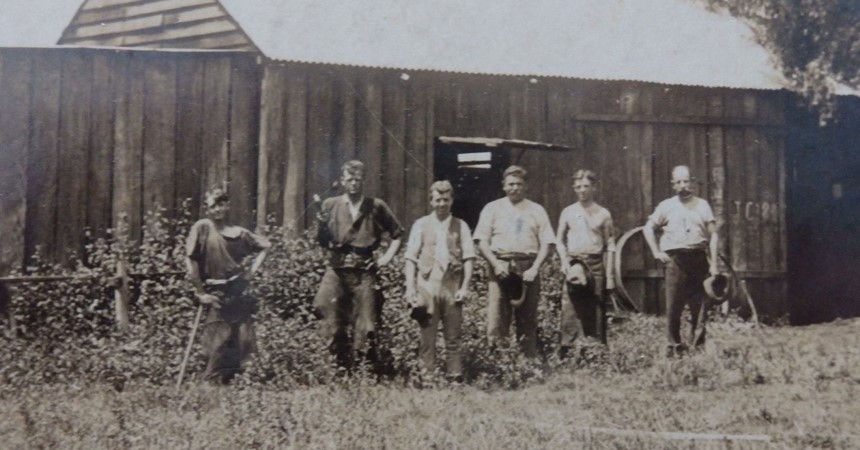Henry Crebert, born in 1856, was the fourth son of Peter Crebert, one of Newcastle’s first vignerons. Peter Crebert (after whom Crebert Street Mayfield is named) brought a lot of his family out from Germany after finding success in wine making. Henry achieved his own success as founder of H Crebert & Sons a blacksmithing, coach and sulky building business in Lochinvar. Four of his sons, Frank, Jack, Edward and Peter, worked in the family business. The business prospered for 100 years, with Jack closing it in 1982 at age 86.
Henry’s sons Frank and Fred both went to war, as did a few cousins – some of whom did not come home. My grandfather Jack remained in employment in the blacksmith shop as it was an essential service to repair farm equipment and make and fit the horseshoes so farmers could continue to tend their crops in order to feed the locals during the war. The shop became renowned for the quality of workmanship and the Creberts for their incredible community involvement and generosity.
There were simmering tensions due to the fact that Germany was seen as the enemy. In 1916 a fire completely destroyed H Crebert & Sons and, after police investigations, it was eventually believed to be the result of an arson attack with anti-German sentiment as its motivation. Lost in the blaze were a number of vehicles, tools, and stock totalling 500 pounds (approximately $35,000 in today’s terms). The shop was uninsured.
The community of Lochinvar rallied around Henry. There was a public meeting and the locals decided to hold a fundraiser to assist him in his time of need.
In December 1916 Henry was presented with a purse of sovereigns totalling 172 pounds, and Mr Clift donated all of the roofing iron to rebuild the shop. In the speech by the MC, Henry and his family were congratulated on their 'obliging qualities and willingness to assist at all times' and there was great cheering with Henry 'visibly affected'.
Both Frank and Fred returned from war unharmed. They received a hearty welcome at the School of Arts Hall social where they were presented medals and enjoyed the singing of their sister Josephine.
In spite of losing his entire shop to an arson attack, the community ensured that Henry knew that his contributions had not gone unnoticed and he went on to rebuild a bigger and better shop which prospered until the 1980s. This, to me, is truly a triumph over petty racism. It also highlights the personal qualities of a man and his family who served the community and ultimately their country, and a strong and appreciative community who supported their neighbour and friend.






















































































